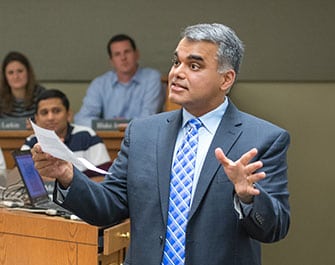Sameer Srivastava is a relative newcomer to Piedmont and the Bay Area, but he is already making his mark. Sameer and his family moved to Piedmont from Boston seven years ago. His wife, Ruju, is a physician who works for a biotechnology firm in Emeryville that is focused on oncology drug development. They have two boys, Rohan (19), who will be a freshman in college this fall, and Sajan (16), who will be a junior at PHS. They all enjoy playing tennis and bridge. Sameer recently started playing guitar, and sometimes plays with Rohan and Sajan.
Professionally, Sameer is an Associate Professor and Harold Furst Chair in Management Philosophy and Values at UC Berkeley’s Haas School of Business. At Haas, he teaches a course on power and influence in organizations. In his research, he uses computational methods to study various facets of organizational culture and their implications for individual, group, and organizational success. Sameer has also volunteered extensively around issues in the Piedmont schools, including the Math Task Force and Piedmont Education Foundation (PEF).
But it’s in his other volunteer work, with the Family Independence Initiative (FII) headquartered in Oakland, where Sameer seeks to promote major social change in the Bay Area and beyond.
“I think inequality is perhaps the signature challenge facing the US today because it is threatening our social fabric and placing tremendous strain on our democracy.”
Sameer Srivastava
He adds that “FII has a promising approach to addressing inequality for three reasons: (1) they trust families to make good choices for themselves and focus on solutions that originate from families and their local communities; (2) they focus on systematic data collection and evidence-based solutions; and (3) they recognize the importance of interpersonal connections and social support in lifting families from poverty.”
From its founding in 2004 in Oakland, FII has worked with 3,400 families in 14 American cities, and projects another 1,600 families by the end of 2019. Families enter the program in groups of 5 to 7. Each agrees to provide personal and financial information every month, through the “UpTogether” platform. FII helps families by analyzing and sharing these data, and provides resources, in the form of grants and loans, based on the data provided. For the first six months, each family receives $800. After six months they gain access to the UpTogether Fund, from which they can receive up to $2,400 during the next 18 months. The organization doesn’t provide any other direction or services, instead relying on the enterprise and persistence of the families themselves.
FII is funded primarily by philanthropic foundations both nationally and regionally. They are also growing their individual donor base.
“The major impact of FII’s work is tricky to assess. It’s true that families that participate do a lot better over time. But this is very much driven by the efforts that families themselves exert. FII views itself as a catalyst for changes that families are already making.”
Sameer Srivastava
He adds that “disentangling the “treatment” effect of FII from the “selection” effect of families choosing to participate is hard; however, FII has commissioned a series of research studies that are designed to do just that.”
Sameer’s involvement with FII started in early 2018, when he was recruited to join the Board by a friend who was then the Board Chair. Given his professional experience with strategy (he previously worked as a management consultant) and data analysis (he co-directs the Berkeley-Stanford Computational Culture Lab), Sameer now serves on the FII Board’s strategy and program evaluation committees. According to Sameer, recent strategic decisions have included a focus on fewer geographic locations, which will help FII better channel resources to, and catalyze support among, the families that will most benefit from them. FII is also pursuing partnerships with academics like Sameer to analyze the data families provide and figure out which approaches really work. In terms of evaluation, Sameer is helping to design metrics for how best to use FII’s resources and allow it to scale further.
In addition to the technical work, Sameer enjoys the diversity of viewpoints among the other FII Board members. Some come from finance, others from the non-profit world. He thinks that FII’s approach appeals to both sides of the political spectrum, with progressives appreciating the idea of families exiting the cycle of poverty, and conservatives applauding the self-help components of the program.
For more information about FII and Sameer, please visit FII’s website at www.fii.org, and Sameer’s website at https://haas.berkeley.edu/faculty/srivastava-sameer/.

Sameer sets a great example!